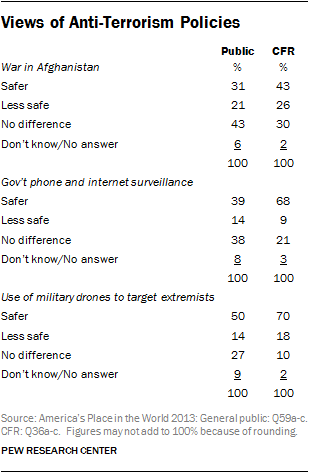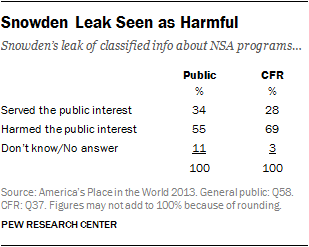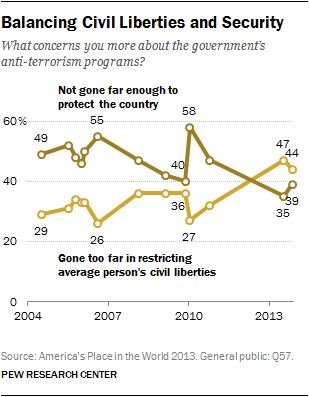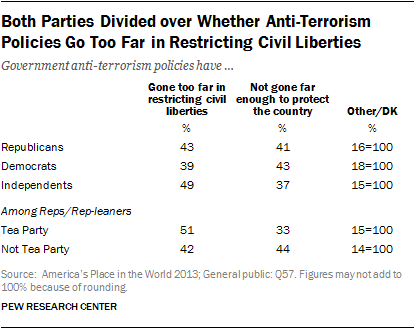
Most Americans say the ability of terrorists to launch another major attack on the United States is at least the same (36%) or greater (34%) than at the time of the September 11th attacks. This view is reflected in the public’s assessments of key policies in the fight against terrorism.
For example, just 31% believe the war in Afghanistan has made the U.S. safer, while 21% say it has made the country less safe and 43% say it has made no difference. Similarly, 39% think the government’s phone and internet surveillance programs have made the U.S. safer from terrorism, but more than half (52%) say these programs have either made it less safe (14%) or have not made a difference (38%).
Evaluations of the use of military drones to target extremists are somewhat more positive, with half saying it has made the U.S. safer, but a substantial minority does not think that is the case; 14% say the use of drones has made the country less safe and 27% say it has not made a difference.
The public’s perception of a terrorist threat and its evaluations of anti-terrorism policies differ considerably from that of CFR members. Two-thirds (67%) of Council members believe a major terrorist attack on the U.S. is less likely than it was in 2001; about as many say the use of drones and the NSA’s surveillance programs have made the country safer (70% and 68%, respectively). And while most say the war in Afghanistan has, at best, not made a difference, more than four-in-ten (43%) believe it has made the U.S. safer from terrorism.
Among the public, assessments of whether the use of drones and the government phone and internet surveillance programs have made the U.S. safer from terrorism do not vary considerably across partisan groups. However, Republicans are more likely than Democrats and independents to say the war in Afghanistan – begun by Republican president George W. Bush – has made the country safer; 41% of Republicans offer this view, compared with 27% of Democrats and 28% of independents.
Snowden Leaks Seen as Harming the Public Interest

Among the public and CFR members, majorities say the leak of classified information about the government’s surveillance programs by former NSA contractor Edward Snowden has harmed the public interest. Fully 55% of the public say the leak has been harmful, while 34% say it has served the public interest. Opinions are even more negative among Council members; 69% say the leak has harmed the public interest, while 28% believe it has served the public interest.
While there is little difference on public attitudes about the Snowden leak across party lines, the views of Tea Party Republicans differ considerably from those of non-Tea Party Republicans. Republicans and Republican-leaning independents who do not agree with the Tea Party are twice as likely to say the leak has harmed as to say it has served the public interest (61% vs. 30%). Among Republicans and GOP-leaners who agree with the Tea Party, about as many see the leak of classified documents as harmful (45%) as say they have served the public interest (43%).
Terrorism and Civil Liberties

A 44% plurality of Americans are concerned that the government’s anti-terrorism policies have gone too far in restricting civil liberties of average people, while 39% are more concerned that these policies have not gone far enough to adequately protect the country. In July 2013, about half (47%) expressed concern that the government was restricting civil liberties too much, while 35% worried that it was not going far enough to protect the country.
As recently as January 2010, a majority (58%) expressed greater concern that government policies had not gone far enough to provide protection from terrorism than that they had gone too far in restricting civil liberties (27%).
CFR member are also concerned about civil liberties; 52% say the government has restricted civil liberties too much, compared with 46% in 2009.

About one-third of CFR members (32%) say the government has not gone far enough to protect the country, virtually unchanged from four years ago.
Republicans and Democrats are equally divided on this question. About four-in-ten Democrats (43%) say the government’s anti-terrorism policies have not gone far enough to adequately protect the country, while about as many (39%) are concerned that that these policies have gone too far in restricting civil liberties.
Similarly, among Republicans, 41% say the government’s policies have not gone far enough to protect the country and 43% believe they have gone too far in restricting civil liberties. Among independents, about half (49%) say anti-terrorism policies have restricted civil liberties too much, while somewhat fewer (37%) express concern that they have not gone far enough to protect the public.
Tea Party Republicans are more concerned than non-Tea Party Republicans about the impact of anti-terrorism policies on civil liberties. About half (51%) of Republicans and Republican-leaning independents say the government has gone too far in restricting civil liberties, while a third say these policies have not gone far enough to provide adequate protection. Republicans and GOP-leaning independents who do not agree with the Tea Party are about evenly divided; 44% are concerned that the government’s policies do not go far enough to protect the country and 42% think they restrict civil liberties too much.




